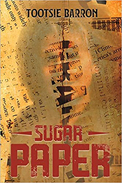
 |
Uncle is always there for Kiki. As doting godfather to her child and a nearly omniscient, problem-solving presence when her no-good husband gets into scrapes, Uncle is always one step ahead, a trusted fixer and protector who treats Kiki (his "princess") like a precious commodity and an infallible superheroine. If Kiki wonders why she is worthy of such timeless devotion, she is patient and compliant. She allows the course of her life to be set and guided in a 1960s environment of gamblers, bookmakers, and organized crime that connects two Jewish and Catholic friends across generations, ultimately empowering Kiki in ways she and her male-dominated society never expected.
There is a mystery here, a suspenseful story whose ending is dangled in a tantalizing fashion. Likewise, history is told through the lens of American war, sports, ethnic subcultures, and crime. At the core, however, this is a character story of individuals and their choices to love and protect their own while defining their own paths of loyalty and earning, even if that places them outside the law. In this sense, the characterizations read as both fresh and familiar.
Kiki's tough talk and willingness to step up to perform as asked, contrasted with her subordinate place in a male-dominated culture, are reminiscent of other familiar organized crime matriarchs and daughters, from HBO's Carmella and Meadow Soprano to the movie The Kitchen and even back to Mario Puzo's 1965 epic maternal powerhouse, Lucia Santa, in The Fortunate Pilgrim. Uncle likewise evokes the vision, power, and connections of such Jewish figures in history as Meyer Lansky and Bugsy Siegel. All told, the foundation of Uncle's love and guidance propel Kiki toward a future bright with shattered glass ceilings and a road that she, not her patriarchy, defines on her own terms.